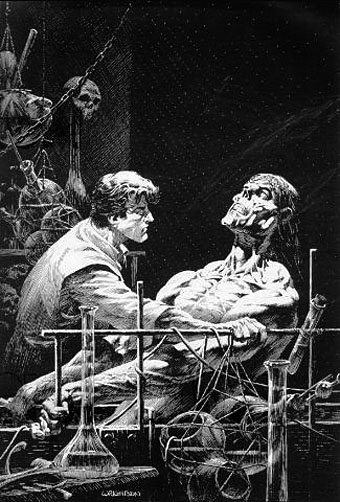MARY SHELLEY’S FRANKENSTEIN

“The world was to me a secret which I desired to divine.”

“It was the secrets of heaven and earth that I desired to learn; and whether it was the outward substance of things or the inner spirit of nature and the mysterious soul of man that occupied me, still my inquiries were directed to the metaphysical, or in its highest sense, the physical secrets of the world.”

“The different accidents of life are not so changeable as the feelings of human nature. I had worked hard for nearly two years, for the sole purpose of infusing life into an inanimate body. For this I had deprived myself of rest and health. I had desired it with an ardour that far exceeded moderation; but now that I had finished, the beauty of the dream vanished, and breathless horror and disgust filled my heart.”
When I first encountered these words, I was a young boy, just discovering that there was a world and wealth of stories out there to hear, read, and see. This is one of the first that captured my imagination, and it has been with me ever since.
The first version of The Post-modern Prometheus that I owned was an audio tape, wherein an abridged version of the story was read by a man with a very deep voice. I can still hear his voice in my head, reading the words in the above paragraphs. And though the darkest parts of the story were either removed, reworked, or glossed over, it could not erase the intensity, terror, and tragedy of Victor Frankenstein and his creation.
I don’t know what happened to that tape, but I really hope it turns up at some point in the future. It’s one of those things that I can physically point to and say, “This made me want to be a writer.”
The first of what I consider to be the “classic, gothic trilogy” of novels – all three of which are on this list – Mary Shelley’s Frankenstein has impacted the societal mind in a way that few stories have throughout history, resonating with the primal core of mankind. The relationship displayed in the novel between the creator and his creation is a haunting tale, one that has spawned countless iterations, some good, some not so good, but none coming close to the original. There has not been a film, comic or re-telling of any kind that can do justice to the utter horror of Shelley’s story, and this is made all the more staggering by the fact that it was written by an eighteen-year-old girl in the early 1800’s.
Not only does this story prove that science fiction and fantasy has been around for far longer, and has a much richer history than most people realize, it proves that the science fiction and fantasy and horror genres can be just as timeless, compelling, literary and deep as any other.
One of the things I love about the story of Victor Frankenstein is that he is presented as the protagonist and the monster is taken for granted as the antagonist. Yet throughout the progression of the story these roles are slowly and subtly reversed, until the reader begins to sympathize with the monster and grows to detest Victor and his lack of responsibility to the very thing which he created.
Eventually, the reader begins to feel that perhaps the good doctor received what he deserved. Frankenstein’s impulse to tread in God’s territory has dire costs, and he tries to avoid paying them, but to no avail. Though the misfortune that befalls Victor is indeed tragic, the fates of his brother, his best friend, his wife and the rest of his family could have been avoided if only he had made a different choice.
And in the end, tears are shed not for Dr. Frankenstein, but for the tragedy of the creature himself, his isolation, his loneliness, and his simple desire to connect with another living thing.
A powerful story about the fascination with the darker parts of the universe and the calamity that ensues, Shelley – like all great story-tellers – taps into a fundamental and basic facet of what it means to be human. It just so happens she used a monster to do it. And – like all great stories – the reader is left questioning long after the story is over: Who is the real monster, the creator or the creature?
Quotes from Mary Shelley's Frankenstein
Images Copyright Bernie Wrightson
